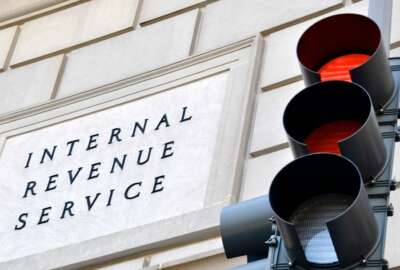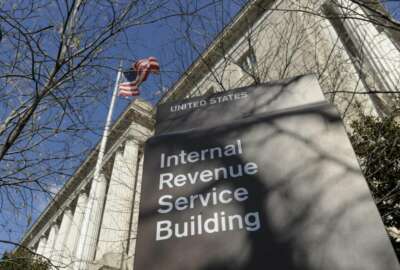IRS makes rare call to set higher gas reimbursement rate for rest of 2022
The IRS outlined “pass-through” provisions of its 2022 National Agreement with the National Treasury Employees Union, which apply to agency managers and...
UPDATE: This story was updated at 5:55 p.m. on Thursday, June 9 to reflect the IRS announcement that it will increase the mileage rate for the remainder of 2022, starting July 1.
The Internal Revenue Service is making a rare midyear decision to set a new, higher mileage reimbursement rate, in light of increasing gas prices.
The IRS announced Thursday that for the final 6 months of 2022, the standard mileage rate for business travel will be 62.5 cents per mile — up 4 cents from the rate the IRS set at the start of the year.
This new rate goes into effect July 1, and applies to workers who use their own vehicles for business travel.
“The IRS is adjusting the standard mileage rates to better reflect the recent increase in fuel prices,” IRS Commissioner Chuck Rettig said in a statement Thursday. “We are aware a number of unusual factors have come into play involving fuel costs, and we are taking this special step to help taxpayers, businesses and others who use this rate.
The IRS normally updates the mileage rates once a year in the fall for the next calendar year.
The change comes after the National Treasury Employees Union pressed the IRS to approve the increase, considering the Russian invasion of Ukraine in February and the resulting higher gas prices.
The federal government’s mileage reimbursement rate for federal employees and contractors matches the amount set by the IRS as the maximum rate allowed to be deducted as a business expense.
The IRS set the rate to 58.5 cents per mile — a 2.5 cent increase from the year prior — but Reardon, in a letter to Rettig, said the sudden uptick in gas prices warrants a mid-year adjustment in the reimbursement rate.
“Given the current situation, I urge you to make a mid-year adjustment to the mileage reimbursement rate this year to reflect the actual costs an employee will pay to operate their privately owned vehicle while traveling to perform official business,” Reardon wrote. “This would save federal employees from having to pay out of their own pocket for the increased travel expenses incurred in their duties as IRS revenue agents and officers.”
Reardon said some federal employees whose jobs require frequent travel during the workday, including bank examiners at the Federal Deposit Insurance Corporation, are particularly hit hard by current gas prices. A higher reimbursement, rate, he added, would also provide relief for many private-sector employees.
“I hope you will do whatever you can to see that all Americans who must depend on their cars to perform their jobs get some relief, including those who work for the federal government,” Reardon wrote.
While the IRS usually sets its reimbursement rate to cover the entire calendar year, the IRS has previously made some mid-year adjustments.
The IRS made its most recent mileage reimbursement in December 2021, based on an annual study of the fixed and variable costs of operating a car.
IRS management once again covered by parts of union-negotiated contracts
Meanwhile, the IRS is telling its non-bargaining unit management workforce that portions of its union-negotiated labor contracts once again cover them.
The IRS, in a May 13 memo to all IRS managers, outlined “pass-through” provisions of its 2022 National Agreement with NTEU, which will also apply to agency managers and non-bargaining unit employees.
The pass-through provisions cover a wide range of topics, including performance awards, promotions, telework, travel, sick leave, family leave and annual leave.
IRS Chief Human Capital Officer Kevin McIver in the memo directs managers to bring any questions about the pass-through provisions to the agency’s labor and employee relations specialists.
The Professional Managers Association, which represents IRS management, said Tuesday that the IRS suspended pass-through provisions in 2019.
The PMA said the newest memo not only restores the practice of pass-through provisions, but also reinstates all prior pass-through memos.
PMA Executive Director Chad Hooper said the memo represents “a commonsense change that will improve management and eliminate inefficiencies.”
“PMA has long advocated for uniformity in employee treatment. The previous system required managers to learn different procedures for different employees and ensure the proper procedures were followed each time a basic issue arose. This left significant room for error and mismanagement and created frustration for employees,” Hooper said.
Among the provisions in the 2022 NTEU national agreement, IRS managers are entitled to a per diem when on temporary duty, and more than 50 miles away from their official duty station or residence.
Another pass-through provision makes IRS managers eligible for a child care subsidy if their annual family income is less than $90,000.
Managers are can be granted administrative time to receive a COVID-19 booster shot, if those shots aren’t made available at their official duty station.
Managers and non-bargaining unit employees would also be covered in any Reduction-in-Force mitigation strategies, including early retirement and buyout offers.
NTEU President Tony Reardon said Tuesday that agency leaders often make bargaining unit provisions “available at all levels up and down the pay scale” to improve recruitment and retention.
“It is no surprise that some of the benefits that NTEU negotiates on behalf of frontline federal employees are extended to their supervisors, too,” Reardon said. “Our chapter leaders frequently hear from managers outside the bargaining unit who are grateful for provisions in our contracts like telework, alternate work schedules and other benefits, because it prompts management to grant them to employees not represented by NTEU as well.”
Hooper said that since 2019, agency managers have had to handle basic employee issues in different ways, depending on if the employee was in the bargaining unit.
“Something as simple as processing a sick leave request was subject to varied procedures based on an employee’s bargaining unit status,” Hooper said.
Hooper said the new memo makes official all portions of the union contract that apply uniformly to the entire IRS workforce.
“It establishes consistent and uniform rules for employees regardless of bargaining unit status–increasing efficiency and eliminating confusion,” Hooper said. “Conversely, the pass-through memo ensures managers only need to learn and execute one process and one set of rules,” Hooper said.
Copyright © 2025 Federal News Network. All rights reserved. This website is not intended for users located within the European Economic Area.
Jory Heckman is a reporter at Federal News Network covering U.S. Postal Service, IRS, big data and technology issues.
Follow @jheckmanWFED






